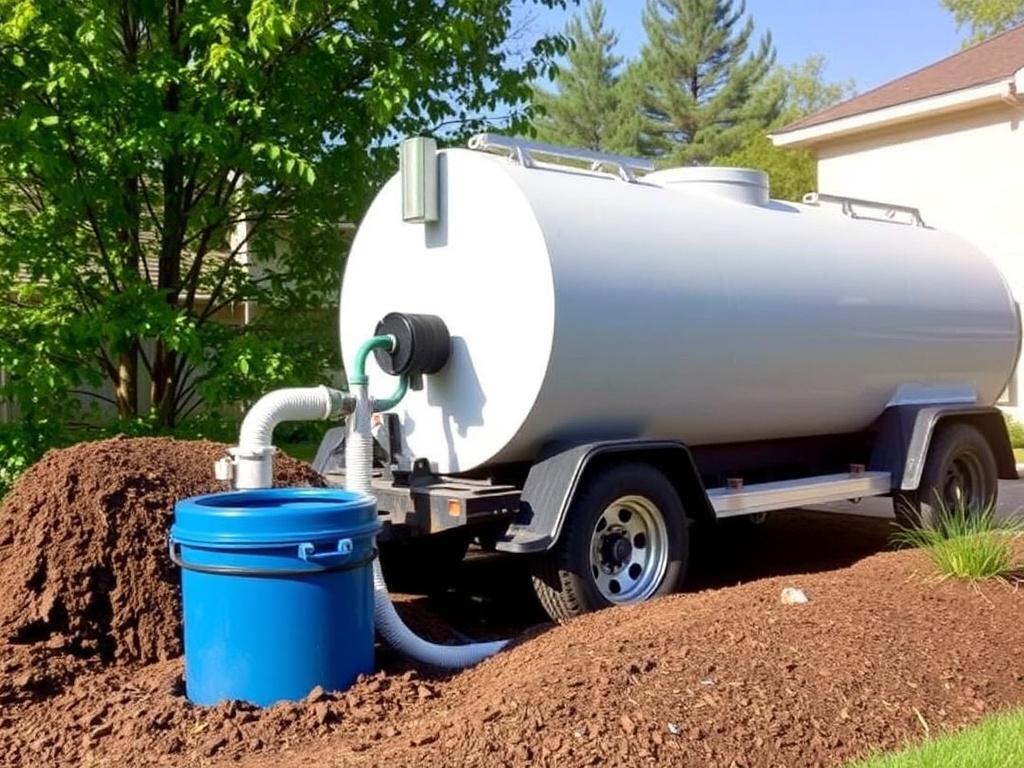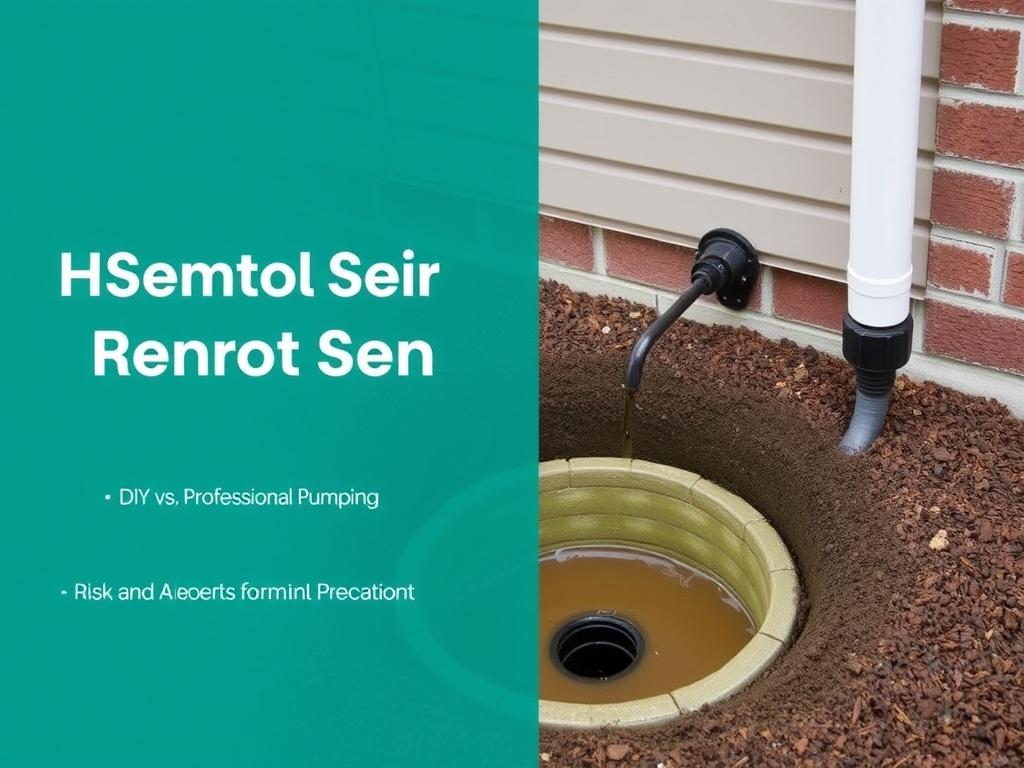Septic tanks are an essential part of many homes, especially those not connected to municipal sewage systems. They quietly and efficiently manage household wastewater, but their importance is often overlooked until there’s a problem. One of the most common questions homeowners ask is, “How often should you pump your septic tank?” The answer isn’t one-size-fits-all since several factors influence the frequency of pumping. In this article, we’ll explore everything you need to know about septic tank maintenance, how often you should pump your septic tank, and how to keep your system running smoothly for years.
- Understanding the Basics: What Is a Septic Tank?
- Why Is Septic Tank Pumping Important?
- Factors That Affect How Often You Should Pump Your Septic Tank
- Household Size and Water Usage
- Tank Size
- Garbage Disposal Usage
- Water Conservation Practices
- Soil Type and Drain Field Size
- How to Determine When It’s Time to Pump Your Septic Tank
- Recommended Pumping Frequencies by Household Size
- Signs Your Septic Tank Is Full and Needs Pumping
- How Septic Tank Pumping Is Done: What to Expect
- DIY vs. Professional Pumping: Risks and Recommendations
- Checklist for Choosing a Septic Pumping Service
- Tips for Extending the Time Between Septic Tank Pumpings
- Environmental and Health Consequences of Neglecting Septic Tank Maintenance
- Cost Considerations: How Much Does Septic Tank Pumping Cost?
- Keeping Records: Why Tracking Your Septic Tank Pumping History Matters
- Local Regulations and Septic Tank Maintenance Standards
- Summary Table: Key Factors Influencing Pumping Frequency
- Conclusion
Understanding the Basics: What Is a Septic Tank?

Before diving into how often you should pump your septic tank, it’s vital to understand what a septic tank is and how it works. In essence, a septic tank is an underground container that receives wastewater from your home’s plumbing. It separates solids from liquids, breaks down organic matter, and stores sludge and scum while allowing treated effluent to pass into the drain field.
If you think of it simply, the septic tank acts like a filter and a settling chamber. Heavy solids settle at the bottom, forming sludge, while lighter materials such as oils and grease float on the surface, known as scum. Bacteria inside the tank help digest some of this waste. However, sludge and scum accumulate over time, which is why pumping your septic tank regularly is important.
Why Is Septic Tank Pumping Important?

Neglecting septic tank pumping can cause several issues. When sludge and scum build up excessively, they can overflow into the drain field, clogging it and preventing proper wastewater absorption. This leads to backups inside your home, foul smells, and potentially costly repairs. Pumping removes this buildup before it causes damage, keeping your system effective and extending its lifespan.
Here’s a quick look at the benefits of regular septic tank pumping:
- Prevents system backups and overflows
- Protects the drain field from clogging
- Avoids expensive repairs or replacements
- Protects the environment from contamination
- Improves the efficiency of wastewater treatment
Factors That Affect How Often You Should Pump Your Septic Tank
Now that we know why pumping is necessary, let’s discuss what influences how often you should pump your septic tank. The general recommendation might be every three to five years, but this can vary widely. Here are the main factors to consider:
Household Size and Water Usage
The more people living in your home and the more water you use daily, the faster your septic tank fills up with solids. For instance, a family of six will likely need to pump their septic tank more often than a single person living in the same sized home due to the higher volume of wastewater produced.
Tank Size
A larger septic tank can hold more waste before it needs pumping. Most residential tanks range from 750 to 1,250 gallons. Knowing your tank’s capacity helps estimate how quickly sludge and scum accumulate.
Garbage Disposal Usage
Garbage disposals introduce more solids into the septic system, increasing the amount of sludge buildup. Regular use of a garbage disposal generally means you should pump more frequently.
Water Conservation Practices
Using water-saving fixtures, fixing leaks, and spreading out water usage reduce the flow into your septic tank. This can slow sludge buildup and reduce pumping frequency.
Soil Type and Drain Field Size
Some soils drain better than others, affecting how efficiently the drain field handles effluent. If your soil doesn’t drain well, a clogged drain field can happen faster, making regular pumping even more critical.
How to Determine When It’s Time to Pump Your Septic Tank
Aside from following general guidelines, it helps to know the signs indicating your septic tank needs pumping:
- Slow drains: Water takes longer to drain in sinks, tubs, and toilets.
- Foul odors: Smells from drains or near the tank location.
- Standing water: Water pooling near the drain field or septic tank area.
- Sewage backup: Wastewater comes up through drains or toilets.
- Overflow or soggy drain field: Grass over the drain field looks greener or soggier than other areas.
If you notice these, it often means the sludge and scum levels are too high and pumping is overdue.
Recommended Pumping Frequencies by Household Size
Here’s a handy table to help you get an idea of how often you should pump your septic tank based on the number of people in your household and tank size. This table assumes average water usage and no garbage disposal.
| Household Size | Tank Size | Recommended Pumping Frequency |
|---|---|---|
| 1-2 people | 750-1,000 gallons | Every 5-7 years |
| 3-4 people | 1,000-1,250 gallons | Every 3-5 years |
| 5-6 people | 1,250 gallons or more | Every 2-3 years |
| Garbage disposal in use | Any tank size | Shorten frequency by 1 year (e.g., pump every 2-4 years instead of 3-5) |
Keep in mind these are general guidelines — your specific conditions may require adjustments.
Signs Your Septic Tank Is Full and Needs Pumping
In addition to following recommendations, being alert to the early signs of a full septic tank can save you from costly repairs.
- Gurgling sounds in plumbing: This unusual noise often means there is a blockage caused by excess sludge.
- Slow or backed-up toilets and sinks: They could indicate the tank is full or drain field is blocked.
- Patch of lush green grass: Excess moisture from a failing tank can cause an unusually green area over the drain field.
- Surface sewage or pooling water: Wastewater surfacing near the tank or drain field is a critical warning sign.
If any of these symptoms show up, don’t delay in scheduling septic tank pumping.
How Septic Tank Pumping Is Done: What to Expect
Many homeowners wonder about the process of pumping their septic tank. It’s a job best left to professionals because it requires specialized equipment and safety knowledge.
Here’s a simple overview of the process:
- Locate the septic tank: The septic system’s owner’s manual or a professional can help find the tank and access ports.
- Inspect the tank: The technician will check sludge and scum levels to gauge pumping needs.
- Pump out the tank: Using a vacuum truck, the technician removes all sludge, scum, and liquid from the tank.
- Clean the tank: The interior walls and baffles may be cleaned to remove buildup.
- Inspect and maintain the system: The technician looks for cracks, leaks, and other potential problems.
- Properly dispose of waste: The contents are taken to a treatment plant or other authorized facility.
Most pumping appointments take about 1-2 hours depending on tank size and condition.
DIY vs. Professional Pumping: Risks and Recommendations

Although septic tank pumping might seem like a straightforward task, attempting it on your own is not advised. The equipment needed is expensive and heavy, not to mention hazardous. Toxic gases accumulate inside the tank and physical entry is extremely dangerous.
Hiring a licensed professional guarantees your tank is pumped safely and disposed of properly, reducing risk to your family and environment.
Checklist for Choosing a Septic Pumping Service
- Licensed and insured company
- Positive customer reviews
- Transparency about pricing and services
- Experience with your type of septic system
- Availability for emergencies or quick scheduling
Always ask for a copy of the service report after pumping as it can help track tank maintenance history.
Tips for Extending the Time Between Septic Tank Pumpings
While regular pumping is necessary, several habits can help slow sludge buildup:
- Use water efficiently: Fix leaks, install low-flow fixtures, and spread out laundry loads.
- Avoid flushing harmful items: Don’t flush grease, diapers, wipes, or chemicals down the drain.
- Limit garbage disposal use: Reduce solid waste entering your tank by composting or trash disposal.
- Regular inspections: Have your septic system inspected annually to catch problems early.
- Protect the drain field: Don’t park vehicles or plant deep-rooted trees near it.
Making these simple adjustments can help maintain a healthy septic system and prolong pumping intervals.
Environmental and Health Consequences of Neglecting Septic Tank Maintenance
Failing to pump your septic tank as recommended doesn’t just risk plumbing issues; it’s a serious threat to the environment and public health. Overflowing septic tanks can release untreated sewage into groundwater and nearby water bodies, contaminating drinking water sources. This pollution introduces harmful pathogens, nitrates, and other contaminants, leading to illnesses and ecosystem damage.
Regular pumping and timely maintenance ensure your septic system treats wastewater properly, safeguarding your family and community.
Cost Considerations: How Much Does Septic Tank Pumping Cost?
The cost of pumping your septic tank varies depending on location, tank size, and company rates. On average, expect to pay between $250 and $600 per pumping service. Larger tanks or system repairs can increase costs.
Keep in mind that regular pumping helps avoid much more expensive repairs or septic system replacements, which can cost thousands of dollars. Think of pumping as a cost-saving investment in your property.
Keeping Records: Why Tracking Your Septic Tank Pumping History Matters
A good practice for every septic system owner is maintaining detailed records of all pumping and maintenance. This documentation is useful when selling your home, troubleshooting septic issues, or complying with local regulations.
Your septic service provider will typically give you a report after each pumping showing sludge levels, any problems found, and recommendations.
Local Regulations and Septic Tank Maintenance Standards
Some municipalities or states have specific rules about septic tank pumping frequency and inspection requirements. It’s important to check with your local health department or environmental agency to ensure you’re in compliance. They may also offer guidance or subsidized septic maintenance programs.
Summary Table: Key Factors Influencing Pumping Frequency
| Factor | Effect on Pumping Frequency | Example |
|---|---|---|
| Household Size | More residents = more frequent pumping | Family of 6 pumps every 2-3 years |
| Tank Size | Larger tank = less frequent pumping | 1,250-gallon tank pumps less often than 750-gallon tank |
| Garbage Disposal Use | Accelerates sludge buildup, increases pumping frequency | Pump 1 year earlier if using disposal |
| Water Conservation | Reduces wastewater, extends pumping interval | Low-flow fixtures delay pumping needs |
| Soil & Drain Field | Poor drainage means more frequent pumping to avoid backups | Clay soil may clog drain field faster than sandy soil |
Conclusion
So, how often should you pump your septic tank? While general advice suggests every three to five years, the reality depends on factors such as household size, tank capacity, water usage, and more. Regular pumping is crucial to prevent costly repairs, protect your home and environment, and maintain an efficient septic system. Pay attention to signs of a full tank, avoid harmful habits like flushing grease or overusing garbage disposals, and always trust septic professionals for pumping and inspections. By following these guidelines and keeping a close eye on your septic system’s health, you’ll contribute to it running smoothly for decades to come—saving money, hassles, and protecting your property’s value all along the way.
Помогла вам статья?






